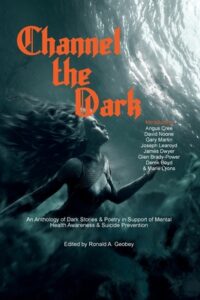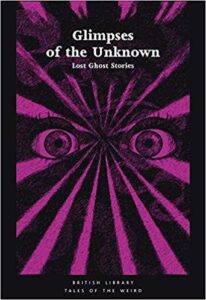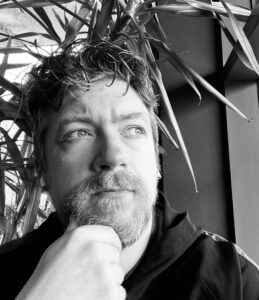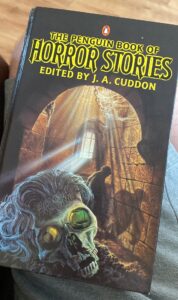(Originally published here)
It was a hard thing, being dead.
Watching the rise and fall of the seasons without the heat of the sun on your face or the chill of a winter storm. Seeing the world change in flashes and cutscenes but with time standing still. Growing attached to the people living in your house (he always thought of them as lodgers) only to find them suddenly grown or gone.
Most of all, Art just felt so very, very tired. Whenever he manifested, it was with a feeling of immense sadness, and with the basement door at his back. He could go anywhere in the house but not beyond the garden. He never went into the basement.
He didn’t think he’d be tired. Weren’t you supposed to sleep when you’re dead? Instead he found himself roaming at all hours, and after all these years he could still never get used to the sensation of knowing his feet were walking without being able to feel wood or carpet underneath him.
He’d love to just stub his toe. Or bang his head on a doorway. That would be amazing. Because he was dead, but didn’t feel dead.
If he concentrated hard enough, really put a lot of effort in, he could move things. More than once his frustrations had boiled into a blind rage and he had lost awareness for a few moments only to find he was standing in a room full of thrown furniture, or next to a chandelier that had been pulled from the ceiling. But he could never remember doing this, despite knowing that he had.
Those days tended to scare the lodgers. Some had walked around burning sage, or brought in priests to sprinkle holy water. That tended to sting for a long time, but he came back eventually, usually with the sense that something was incomplete. It was a very old house, though whether it was old when he was alive he couldn’t say. He could remember nothing from the Time Before.
He didn’t mean to scare people, most of the time. He felt he had been a good person when he was alive, and generally let people be themselves, but he could not abide the slightest injustice toward women.
Once, a very elegant couple and their two children had lived in his house. Avena was tall, with a carefree laugh that reminded him of somebody. She had some business that she ran from home.
Alexei was shorter, well-built, and worked outside the house. He sounded educated, but often reduced his wife to tears with demeaning vulgarity and cruel insults.
Then one evening in summer, he crashed a fist into her stomach. Once. Twice. A third time. As she collapsed, gasping for air as he draped himself on the leather couch, Art was overcome with a bitter flash of memory. It laid itself over the scene as if then and now existed at once. The oak and white furniture of now phased into heavier, darker cabinets and hard chairs. A man in a waistcoat, face crimson with rage (father?) standing over a woman (mother?) who was pleading for her life. “Please,” she said over and over again. “He’s yours, I swear it.”
“You’d say anything, though, wouldn’t ya? I married you when ya had nothing, nothing, took ya outta the gutter where I shoulda left you. And all the while ya’d betrayed me with him, a damned foreigner, like I’m not good enough for ya.”
He punctuated each sentence with a slap of his leather belt and the woman threw her hands up to protect her face. He leaned in close. “I’ll teach ya a lesson, and that little bastard of yours upstairs then.” Faster than Art thought possible, the man wrapped the belt around her throat. She kicked and slashed his face to ribbons but he was fierce and implacable.
With her last breath she reached out, toward Art, her eyes wider with panic. As she slumped to the floor the man stood up and looked where she had been reaching. “There ya are, ya little bastard. I’ll show you and all.”
The man, his face twisted with blind rage, thump thump thumped across the floorboards and swept the boy off the floor and held him before the brass mirror in the hallway. “Look at ya, ya little pup,” the man said in a frenzy, as he throttled a boy no more than twelve years old until his eyes bled. The room spun and Art found himself back where he had been, standing in a doorway watching the two newest lodgers.
He raised his hands in front of where his face should be. He had always fancied that his hands were large, callused and rough, the hands of a man. Now they were slight and bony, the hands of a child with a lot of growing ahead of him. The two visions of himself sat one on top of the other, with the deep sense that had to act, for the sake of the woman who must have been his mother, murdered just a few feet away.
Alexei got up and walked through Art. As Art turned around he saw the man briefly take on the hulking rage of his father before reverting to his normal, well-built shape. That morphing, and seeing his own hands transition from child to man to child again, put the kernel of an idea in Art’s mind, though he wasn’t sure he had the strength to accomplish it.
He crept toward where the woman had pulled herself up by using a side table for support. She could not have been much older than his mother, and though they looked nothing alike Art realised he knew this all along. Drawn by long dormant instinct, he tried to hold his hand out to her, but all that happened was the lamp on the table started to flicker and pulse. The woman saw it, and looked around her. “If somebody is there,” she whispered, “please help me.” She limped off toward the small room he knew she used as an office.
From upstairs came the sound of the shower, and Art’s half-idea blossomed into something fully formed. As he made his way up the stairs, each lightbulb he passed flickering for a moment or two, he wondered how he could feel so much older than a lad of twelve. Had it been the years of watching people come and go? Had he been an old soul even in youth? He knew there was an answer, could feel it rolling around the edges of his consciousness, but it was just out of reach.
No matter. He had a job to do now, and he intended to do it well.
Alexei came out of the shower and wrapped himself in a towel before going to the sink to brush his teeth. He slicked his hair back with his hand, then realised he couldn’t see himself in the steamed mirror, and Art knew his opportunity had arrived. He moved quickly behind Alexei, and as the man wiped the mirror clean Art came forward.
Alexei wasn’t looking as he wiped the glass but then screamed in transfixed horror as he saw not his own face, but a dripping decayed mass of a thing, green in places with decay and mottled with neglect. It was a ruined mockery of a human being, mostly bleached white as if it hadn’t seen the sun in a generation. Its eyes were gouged out and its lower lip missing. The creature laughed at him, a rattling hollow laugh that Alexei could feel right down his breastbone.
“Look upon your sins,” the cadaver said. “Or next time you’ll be joining me in hell.”
Alexei screamed and screamed and screamed and when Avena came up eventually, having enjoyed hearing his terror for over an hour, his hair had gone bone white and he had slashed his eyeballs with his nails. She held him by the jaw, this once supremely confident brute now blinded and hoarse, and laughed. Not a malevolent laugh, but the relieved laugh of one who has had long prayed-for justice. “My guardian angel must have been looking out for me,” she said, mostly to herself as she tapped on her breastbone three times. “Thank you.”
Art, exhausted by concentrating so much on his apparition, faded out to the sound of her whispering “thank you, thank you, thank you”.
Do you dream when you’re dead, he found himself wondering in the void. Or are you remembering? He was not asleep, he could never truly sleep, but he was being overrun by emotions that felt almost ancient. It was like old muscles awakening after being long out of use. Flashes of faces, of darkness, of hands scratching in the dark and crawling through perpetual night. He felt the march of time, felt it flowing through him, and then past him. He saw new faces, families, felt their growth and traces of their memories. He saw lights turning on and off, heard soft steps on the landing, curtains rustling without wind.
When he became fully aware of himself, he was again standing with his back to the basement door. Yet things were different this time. It wasn’t just sadness that he felt. It was tempered now with resolve, determination. He was, he realised, ready to go down there – but he didn’t want to go alone.
Avena, he realised, was not in the house. He could sense her absence, but felt also that the place had not been lived in for some time. How much time has passed, he asked himself. And yet, as he drifted through silent rooms and past covered furniture, it had not changed much. He knew without remembering that he had been here many times since that night, but only as a shadow of himself. He also knew that he had been welcomed.
There was a jangle of keys and the front door opened stiffly. Two women came in confidently, as if it was a long familiar place. The bright winter sunlight obscured their faces until they shut the door behind them, and he found, happily, that one of the women was Avena. She was older, the passage of time marked in crows’ feet and silver streaks in her hair, but she was no less herself. She carried herself with the contentment of a life well lived. The other woman was shorter, with sandy rather than auburn hair, but the resemblance was remarkable. Her daughter, no doubt, and eventually he remembered her name had been Rebecca. No, Becky. She hated Rebecca.
The two took a few steps in and Avena held her hand up to stop Becky. “There,” she whispered, with the hint of a smile. “He’s here.”
“Are you sure you want to do this mom? I mean, it’s his house. It wouldn’t be fair to hurt him.”
“He did something incredible for me, once. He gave me my life back. I want to return the favour Becky. I’ve been waiting years, it’s why I’ve kept this place for so long and why I keep coming back. You know, you thought I was mad when I told you, but then you felt him yourself, that time when your brother had a seizure in the bathtub.”
The daughter nodded. “I remember,” she said gently. “He said he went under and then something pulled him out of the water and just held him up.”
“So now we owe our guardian angel two favours. You know something has trapped him here. That’s what all the books say, isn’t it? Unfinished business? He deserves as much peace as anybody.”
“But we can’t force him out.”
“We won’t. We’ll just give him a way, if he wants it.”
Without thinking, Art made the crystals on a dusty Tiffany lamp jingle. “There!” said Avena. “He’s listening.”
“Can you tap something,” said Becky. “Once for no, twice for yes?”
With amusement, Art tapped twice on the sideboard.
“Do you want us to do something?” Two taps. He knew what he wanted, but how to tell them? They were looking at each other, trying to answer the same question. He moved down the hallway toward the kitchene, then tapped twice on the solid wood doorframe.
“Let’s follow him,” Avena whispered.
“I’m nervous,” said Becky. “What if…?”
“Don’t worry. If we were supposed to be scared of him we would have known that years ago.”
“That’s not what I’m worried about,” said Becky as they walked toward the back of the house. “I’m worried about scaring him.”
Art was confused, as if he should know what they were talking about but couldn’t call it to mind. Having brought them this far, he drifted to the basement door. But it was hard. Part of him absolutely did not want to go down there. The rest of him knew it was time. He tapped twice on the door. Avena and Becky exchanged another look, and Avena unlocked it.
The door swung out into pitch darkness, and Art was overcome with fear. There was pain in the darkness.
“Do you want to go on?” asked Becky. One tap… then a hesitant second. “Do you want us to come?” Two taps.
Avena flicked a switch but the ancient yellow bulb barely threw back the blackness. “I think I only came down here two or three times,” she told Becky. “I never liked it.”
Art had already begun down the stairs, almost cringingly slow as he fought a rising panic and despair. It was pressing on him from the air itself.
“You’re not alone,” said Avena, and he knew she was talking to him. “But it’s the only way we can find out how to help you be at peace.”
The light grew gently brighter, then changed colour, and Art felt himself abruptly shift between then and now. There was a thumping, raging charge down the stairs, right through him and the others. Though they couldn’t see anything, both shivered. The cruelly contorted man was dragging a barely conscious child down the stairs, not caring if his legs clattered and stumbled.
“You’re scum and you’ll stay here,” he roared at the child, before returning back up the stairs and turning the light out, locking the door behind him.
Art felt the sensations of scrabbling around on a dirt floor, inching one direction and then the other in the hope of finding something, anything. His legs weren’t working. It felt like it was going on for hours, before the door was flung open briefly and a heavy thing wrapped in carpet crashed down the steps, knocking the child over. The light lasted just long enough for him to see his mother’s dead face.
Snapshots and sensations washed over him. Lights flicking on and off to taunt him with his mother’s putrifying face while he ate scraps; the sound, not the sight but the sound of rats eating at her eyes and lips in the abyss despite his efforts to fight them off; the hands of a child growing steadily to be the hands of a man, worn and callused from attempts to climb the stairs and pry the door open until his strength grew almost to nothing. And every day, the corpse of his mother kept watch over him.
Sometimes his father, spoke to him; other times, out of guilt or boredom perhaps, he left the light on and threw Art books. But mostly there was just the dark, and silence, and starvation.
The flight through memories slowed, then stopped. His father was sitting by the end of the staircase. He had set a bright flashlight on the step next to him, the intense white casting shadows over every crag of his own decaying face. His great strength had turned to flab, and his breathing was loud and ragged. He had something wrapped in a thick tarpaulin at his feet. Art, having spent half a lifetime in the dark, could barely look in the man’s direction.
“There comes a time,” his father wheezed, “when all accounts … are settled.”
He was staring at the floor as Art lay a few feet away, weak and feverish. His legs had never truly recovered.
“I don’t have much time … left. Maybe your mother … cursed me. Maybe … I am your father … isn’t life a blast? But no more of that.”
“What do you mean?” Art was struggling to think, and was increasingly ill on the floor in the cold.
“I mean … no more of that.” And with a rush of speed belying his decrepit state, from the tarpaulin he dragged a hefty pickaxe, and crashed it down on Art’s stunned face.
Floating outside of themselves, now-Art sharing the space and feelings of then-Art, newly freed from his mortal shell. His father was digging a pit, pausing frequently to rest, and when it was deep enough he used the pickaxe to shove Art’s broken body into it, along with the carpet and what remained of Art’s mother. Art watched the man begin to fill it in and drifted up and out of himself, losing contact with the world and disappearing into the void … before appearing for the first time outside the basement door, ignorant of everything that had come before.
Now-Art walked down the steps, tapping as he went so Avena and Becky would follow. In the centre of the room was a rough, discoloured patch, wide and irregular. He slammed his foot down on it three times, they looked at one another, and then dug at the packed earth with their hands in a flurry.
It was nearly an hour before they found the first shreds of carpet, and another fifteen minutes before they uncovered the skull of a young man. Both of them heard a gasp of pure relief and a whispered “thank you”. And then, for the first time in the longest time, Art slept.




